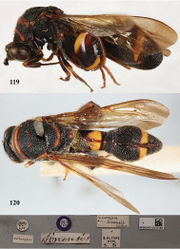Leucospis sinensis
| Notice: | This page is derived from the original publication listed below, whose author(s) should always be credited. Further contributors may edit and improve the content of this page and, consequently, need to be credited as well (see page history). Any assessment of factual correctness requires a careful review of the original article as well as of subsequent contributions.
If you are uncertain whether your planned contribution is correct or not, we suggest that you use the associated discussion page instead of editing the page directly. This page should be cited as follows (rationale):
Citation formats to copy and paste
BibTeX: @article{Ye2017ZooKeys, RIS/ Endnote: TY - JOUR Wikipedia/ Citizendium: <ref name="Ye2017ZooKeys">{{Citation See also the citation download page at the journal. |
Ordo: Hymenoptera
Familia: Leucospidae
Genus: Leucospis
Name
Leucospis sinensis Walker, 1860 – Wikispecies link – Pensoft Profile
- Leucospis sinensis Walker, 1860: 18; Habu 1962[1]: 175; Bouček 1974a[2]: 179; Bouček and Narendarn 1981[3]: 14.
Type material
Lectotype, ♀ (BMNH), “CHINA, Shanghai, Zi-ka-wei”, “B.M. Type Hym. 5.81”, “Leucospis sinensis Walker”, “Lectotype”, NHMUK010370188, designated by Bouček (1974a)[2].
Diagnosis
Body mainly black, with exception of antennal scape partly yellow ventrally, pronotum with two long reddish brown transverse stripes, mesoscutum with two small yellow reddish brown spots submedially, mesoscutellum with curved reddish brown band posteriorly, metapleuron reddish brown, wings brownish, hind coxa reddish brown apically, hind femur with yellow markings ventro-basally and dorso-apically, propodeum with reddish brown spot medio-posteriorly, T1 with broad yellow mark posteriorly, T5 with yellow band posteriorly (Figs 119, 120); pronotum with weak discal carina and distinct premarginal carina; hind femur with nine teeth ventrally, basal tooth much shorter than following six teeth (Fig. 119); hind tibia produced into a spine ventro-apically; propodeum raised medially, with weak median carina; metasoma strongly convex dorsally and medially (Fig. 120); T5 and T6 with ovipositorial furrow (Fig. 120); T1 only carinate medially, without ovipositorial furrow (Fig. 120); ovipositor sheath medium-sized, only reaching half length of T5 (Fig. 120).
Male. Not available in this study.
Biology
Parasitoid of Sphex nigellus Smith (Hymenoptera, Sphecidae) (Bouček 1974a[2]).
Distribution
China (Jiangsu, Shanghai, Taiwan), Japan (Bouček 1974a[2]).
Taxon Treatment
- Ye, X; van Achterberg, C; Yue, Q; Xu, Z; 2017: Review of the Chinese Leucospidae (Hymenoptera, Chalcidoidea) ZooKeys, (651): 107-157. doi
Images
|
Other References
- ↑ Habu A (1962) II. Family Leucospidae. In: Okada Y Uchida T Kuroda N Yamashina Y (Eds) Fauna Japonica. Biogeographical Society of Japan, Tokyo, 165–177.
- ↑ 2.0 2.1 2.2 2.3 Bouček Z (1974a) A revision of the Leucospidae (Hymenoptera: Chalcidoidea) of the world. Bulletin of the British Museum (Natural History) Entomology, Supplement 23: 1–241.
- ↑ Bouček Z, Narendarn T (1981) The Leucospis species of India and adjacent countries (Hymenoptera: Leucospidae). Oriental Insects 15: 1–15. https://doi.org/10.1080/00305316.1981.10434466
